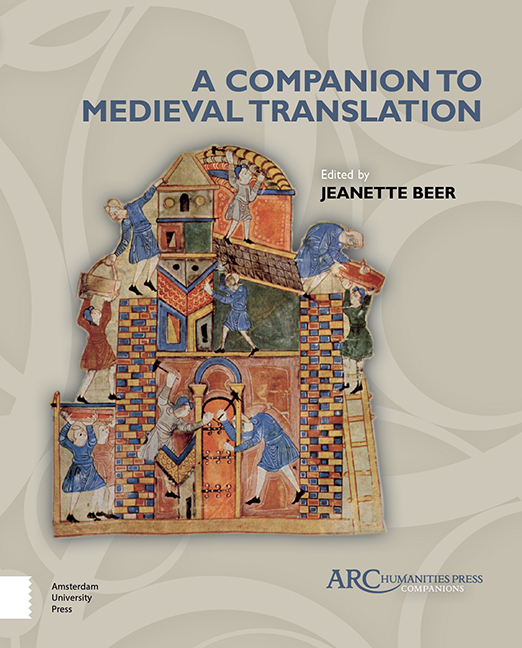Book contents
- Frontmatter
- Contents
- Acknowledgements
- Introduction
- Chapter 1 The European Psalms in Translation
- Chapter 2 The Old French Bible
- Chapter 3 Middle English Religious Translation
- Chapter 4 Bible Translation and Controversy in Late Medieval England
- Chapter 5 Medieval Convent Drama: Translating Scripture and Transforming the Liturgy
- Chapter 6 Translating Romance in Medieval Norway: Marie de France and Strengleikar
- Chapter 7 Christine de Pizan, Translator and Translation Critic
- Chapter 8 Translation, Authority, and the Valorization of the Vernacular
- Chapter 9 Vernacular Translation in Medieval Italy: volgarizzamento
- Chapter 10 Dante and Translation
- Chapter 11 Chaucer and Translation
- Chapter 12 Alchemy and Translation
- Chapter 13 Scientific Translation: A Modern Editor’s Perspectiv
- Chapter 14 Modern Theoretical Approaches to Medieval Translation
- Chapter 15 Observations on Translation by a Thirteenth-Century Maître: Li Fet des Romains
- Epilogue. Observations on Translation by the Oxford Professor of Poetry: Pearl
- General Bibliography
- Appendix
- Index
Chapter 14 - Modern Theoretical Approaches to Medieval Translation
Published online by Cambridge University Press: 20 November 2020
- Frontmatter
- Contents
- Acknowledgements
- Introduction
- Chapter 1 The European Psalms in Translation
- Chapter 2 The Old French Bible
- Chapter 3 Middle English Religious Translation
- Chapter 4 Bible Translation and Controversy in Late Medieval England
- Chapter 5 Medieval Convent Drama: Translating Scripture and Transforming the Liturgy
- Chapter 6 Translating Romance in Medieval Norway: Marie de France and Strengleikar
- Chapter 7 Christine de Pizan, Translator and Translation Critic
- Chapter 8 Translation, Authority, and the Valorization of the Vernacular
- Chapter 9 Vernacular Translation in Medieval Italy: volgarizzamento
- Chapter 10 Dante and Translation
- Chapter 11 Chaucer and Translation
- Chapter 12 Alchemy and Translation
- Chapter 13 Scientific Translation: A Modern Editor’s Perspectiv
- Chapter 14 Modern Theoretical Approaches to Medieval Translation
- Chapter 15 Observations on Translation by a Thirteenth-Century Maître: Li Fet des Romains
- Epilogue. Observations on Translation by the Oxford Professor of Poetry: Pearl
- General Bibliography
- Appendix
- Index
Summary
This chapter explores some of the ways in which modern literary theory opens insights into medieval European translations. Rather than drawing a distinction between theoretical approaches that apply to medieval studies and those that do not, I will explore a few examples that might in turn inspire readers to their own insights. It is my hope that over time readers of this Companion to Medieval Translation will posit many more modern theoretical approaches to medieval translation than can be suggested here. We might even imagine that some of the particularities of medieval European theories of translation could themselves be codified as approaches to texts from other times and places. It is the nature of theory, after all, to exceed its context. Connections grow by analogy across times, places, and cultures. In keeping with this volume's focus, my comments are primarily addressed to Latinate and Germanic languages, although some aspects may apply to other language groups (and Arabic should certainly be included among the medieval European languages).
With these premises in mind, I turned to several relatively recent guides to translation studies to assess how they characterize medieval studies and how they define theoretical approaches. On the first count, medievalists will not be surprised to learn that the codified discipline of translation studies remains oriented primarily toward contemporary contexts. For example, neither Critical Readings in Translation Studies (2010) nor The Routledge Handbook of Translation Studies (2013) address medieval topics. A Companion to Translation Studies (2014) does touch on premodern contexts, seemingly because its broader global scope brought attention to Arabic, Chinese, and Japanese. In these cases, the modern languages are treated as more closely tied to their older forms than Latinate and Germanic languages (with the notable exception of an essay by Kathleen Davis on Old English). The pervasive presentism of these collections underscores both the need for the present volume and the potential for medieval studies to broaden the discipline of translation studies.
Theory is one way to build this two-way street. And translation studies collections provide many roadmaps, with extensive and varied discussions of modern theory. The references are too numerous to summarize usefully, ranging from philosophy to sociology and psycholinguistics.
- Type
- Chapter
- Information
- Companion to Medieval Translation , pp. 165 - 174Publisher: Amsterdam University PressPrint publication year: 2019



